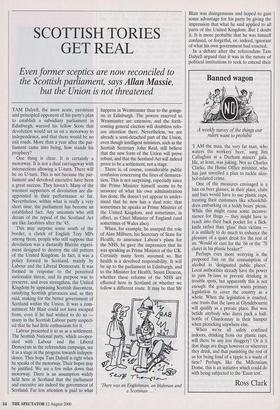SCOTTISH TORIES GET REAL
Even former sceptics are now reconciled to
the Scottish parliament, says Allan Massie,
but the Union is not threatened
TAM Dalyell, the most acute, persistent and principled opponent of his party's plan to establish a subsidiary parliament in Edinburgh, warned his fellow Scots that devolution would set us on a motorway to independence, and that there would be no exit roads. More than a year after the par- liament came into being, how stands his prophecy?
One thing is clear. It is certainly a motorway. It is not a dual carriageway with intersections allowing a U-turn. There will be no U-turn. This is not because the par- liament and devolved executive have been a great success. They haven't. Many of the warmest supporters of devolution are dis- appointed in their performance so far. Nevertheless, within what is really a very short time, the parliament has become an established fact. Any unionists who still dream of the repeal of the Scotland Act are like Jacobites after the '45.
This may surprise some south of the border, a clutch of English Tory MPs among them, people who still suppose that devolution was a dastardly Blairite experi- ment designed to destroy the old pattern of the United Kingdom. In fact, it was a policy formed in Scotland, mainly by Labour and the Liberal Democrats. It was formed in response to the perceived nationalist threat, and its purpose was to preserve, and even strengthen, the United Kingdom by appeasing Scottish discontent, satisfying Scottish grievances and, as they said, making for the better government of Scotland within the Union. It was a com- mitment Mr Blair could not have escaped from, even if he had wished to do so — many in the Scottish Labour party suspect- ed that he had little enthusiasm for it.
Labour presented it to us as a settlement. The Scottish National party, which co-oper- ated with Labour and the Liberal Democrats in the referendum campaign, see it as a stage in the progress towards indepen- dence. They hope Tam Dalyell is right when he speaks of the motorway. Their hopes may be justified. We are a few miles down that motorway. There is an assumption widely held here in Scotland that the parliament and executive are indeed the government of Scotland. Far less attention is paid to what happens in Westminster than to the goings- on in Edinburgh. The powers reserved to Westminster are extensive, and the forth- coming general election will doubtless refo- cus attention there. Nevertheless, we are already a semi-detached part of the Union, even though intelligent ministers, such as the Scottish Secretary John Reid, still believe that the new form of the Union will prove robust, and that the Scotland Act will indeed prove to be a settlement, not a stage.
There is, of course, considerable public confusion concerning the lines of demarca- tion. This is not surprising, especially since the Prime Minister himself seems to be unaware of what his own administration has done. He doesn't yet appear to under- stand that he now has a dual role: that sometimes he speaks as Prime Minister of the United Kingdom, and sometimes, in effect, as Chief Minister of England (and sometimes of Wales also).
When, for example, he usurped the role of Alan Milburn, his Secretary of State for Health, to announce Labour's plans for the NHS, he gave the impression that he was speaking as Prime Minister of the UK. Certainly many Scots assumed so. But health is a devolved responsibility. It will be up to the parliament in Edinburgh, and to the Minister for Health, Susan Deacon, whether these reforms of the NHS are effected here in Scotland or whether we follow a different route. It may be that Mr 'There was an Englishman, an Irishman and a Scotsman . . Blair was disingenuous and hoped to gain some advantage for his party by giving the impression that what he said applied to all parts of the United Kingdom. But I doubt it. It is more probable that he was himself confused, or forgetful, or, indeed, ignorant of what his own government had enacted.
In a debate after the referendum Tam Dalyell argued that it was in the nature of political institutions to seek to extend their Own power, no matter what the previous opinions of their members might have been. He instanced the case of Barbara Castle, strongly anti-European in the Wil- son Cabinet, then elected a Member of the European Parliament and forthwith a powerful advocate for an increase in that parliament's powers. Tam was right. The Scottish Tories opposed devolution as long as it was possible to do so; they argued for the unreconstructed Union till the moment it was reconstructed. What then? They had already lost all their Westminster seats in the 1997 disaster. Were they going to disappear from the scene? Were they going to become latter- day Jacobites sighing for the restoration of what would never be restored?
Of course not. They adapted to reality. They took part in the Scottish parliamen- tary elections and won 17 seats (all on the List) — the result of the modified PR sys- tem adopted for the parliamentary elec- tions. (They have since won a constituency seat — Ayr — in a by-election.) The par- liament, which they had opposed, allowed them to take the first tentative steps towards political recovery; it pulled them back from the brink. They have not agita- ted for the parliament's dissolution. On the contrary, they have tried to use it con- structively. Their leader, David McLetchie, has proved one of the most effective parliamentarians.
Now some Scottish Tories are prepared to go further, demonstrating the validity of the Dalyell thesis. They regard the present devolution 'settlement' as inadequate. They argue that good and responsible gov- ernment is impossible while the parliament depends for its revenue on a block grant from Westminster, and so has the pleasure of spending without being accountable to its electorate for taxing. They are therefore talking of 'full fiscal freedom' — a phrase now being used also by the SNP.
This is also the first indication of what is likely to be a natural consequence of devo- lution: the divergence of Scottish parties from their UK parents. There are Scottish Tories already talking in terms of 'the Bavarian solution'; that is to say, of creat- ing a Scottish Tory party which stands in the same relation to the party in England as the Bavarian Christian Social Union does to the Christian Democrats in the rest of Germany — allied, but distinct.
We are some way down Tam's motorway, then, but it may not end in independence. There are three reasons to think this.
First, much depends on how the Euro- pean Union develops and on Britain's place within it. This is itself uncertain. If the United Kingdom is a full partner in a quasi-federal or — better — confederal Europe, in which the principle of sub- sidiarity is enforced (and in this context the Blair–Cook suggestion of a European Senate drawn from national parliaments is at least interesting), then Scotland might find that the position of Bavaria or Cata- Ionia offered more advantages than that of, say, the Republic of Ireland. (If, on the other hand, Britain stays out of the euro- zone, then the Scots on that motorway have a different choice. In that case, they may decide that a semblance of indepen- dence within the eurozone is better than continued membership of the UK.) Second, there are some even in the SNP who are now asking themselves questions about the reality of the concept of 'sovereignty' in the world today that are hard to answer. At the same time some of the younger nationalists are very much aware of the residual strength of British- ness in Scotland. They recognise that breaking the Union means a leap in the dark; and they are not sure that there is, or will be, a majority for that.
Third, the electoral system of the Scot- tish parliament has been so framed as to make it unlikely that any one of Scotland's four parties can achieve an overall majori- ty. Of course one party might disappear from the map, but that now seems unlike- ly. So the executive will probably continue to be a coalition, as it is now, or a minority administration — which gives more power to the parliament. Consequently, the nationalists may not find themselves able to force a referendum on independence.
In addition, what once seemed a bogey may prove anything but that. Opponents of devolution, myself among them, used to raise the spectre of English nationalism. And indeed, since devolution, English nationalism has been more apparent. It may not, however, prove a monster. Indeed, quite the reverse. Scots have no reason to resent or to fear English nationalism, and, given the strength of Scottish nationalism, it would be impertinent to do so. What Scots — even many who would not describe them- selves as nationalists — have resented is the English tendency to confuse or conflate England and Britain, Englishness and Britishness; as indeed Mr Blair did in mak- ing his NHS announcement, and as he does when he fails to distinguish between his two roles. If the recrudescence of English nationalism enables the English to make the distinction between England and the United Kingdom, then the looser form of Union has a better chance of providing a settlement. Politically, that will, of course, require an attempt to find an answer to Tam Dalyell's other and more famous formulation: the West Lothian Question. But that is matter for another, and different, discussion.



























































 Previous page
Previous page